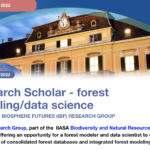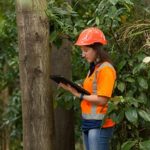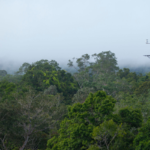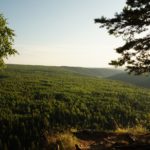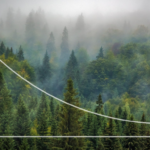PostDoc position – Lawrence Berkeley National Laboratory on modeling vegetation dynamics
There’s an open PostDoc position at Lawrence Berkeley National Laboratory. The position will focus on modeling vegetation dynamics within Arctic ecosystems, and model the impact of climate and disturbance on Arctic shrub distributions and feedbacks to climate change.
Lawrence National Berkeley Laboratory’s (LBNL) Climate & Ecosystems Division has an immediate opening for an Arctic Vegetation Modeling Postdoctoral Scholar to join the team.
We seek a postdoctoral scholar to model the impact of climate and disturbance on Arctic shrub distributions and feedbacks to climate change. You will work closely with a project called NGEE-Arctic. This project aims to increase our understanding of the structure and function of carbon-rich Arctic terrestrial ecosystems, which will go towards advancing Earth system model predictions.
The research goals for you are to analyze and predict changes in arctic shrub distributions in response to climate change, and to explore the controls and consequences of these vegetation shifts using dynamic vegetation modeling. The specific objectives will include developing representations of dynamic Arctic vegetation for a demographic, trait-enabled dynamic vegetation model called ELM-FATES. Additionally, the postdoc will test different drivers and modes of Arctic vegetation competition, survival, and productivity using process-based modeling techniques and field data for validation. Testing modes of plant competition will involve investigating nutrient availability and plant hydraulic stress; nitrogen-fixing vegetation; response to atmospheric changes; evaluating model representation of current and trending distributions of Arctic vegetation types; and using observations to explore potential controls on rates of shrubification.
You will be part of a team developing mechanistic and testable land models that can be applied across spatial and temporal scales and integrated with Earth System Models. Analyzing terrestrial biosphere responses to warming across the pan-Arctic domain is an important component of the research. We particularly encourage applicants with Arctic modeling experience or other Arctic experience.
What You Will Do:
- Develop and apply mathematical, or conceptual models for terrestrial processes across a range of spatial and temporal scales, for implementation into land-surface models.
- Explore the impact of climate change and disturbance on shrub dynamics, carbon cycling, and plant trait distributions in the Arctic.
- Simulate vegetation response to disturbances and environmental stressors, and investigate consequences to plant growth dynamics, and vital rates.
- Simulate seedling processes at the site scale using NGEE-Arctic observations from surveys and experiments.
- Evaluate the extent and drivers of Arctic shrubification.
- Evaluate parameter and structural uncertainty in land models.
- Work creatively, independently, and productively.
- Work as a member of a large multidisciplinary research team.
- Publish peer-reviewed journal articles and present work at scientific conferences.
- Contribute to progress reports and team deliverables.
What Is Required:
- PhD in ecology, earth sciences, or related field.
- Background in terrestrial ecosystem ecology.
- Strong mathematical skills.
- Experience using land-surface biogeochemical models and ecosystem model development.
- Experience in dynamic and demographic modeling.
- Ability to develop numerical representations of terrestrial ecosystem processes suitable for site-level and global scale models.
- Experience in application of models to analyze ecosystem processes (e.g. biogeochemistry, plant demography, carbon allocation).
- Experience in improving model prediction using benchmarking tools and uncertainty quantification.
- Ability to carry out sensitivity analysis and calibration activities.
- Excellent written and oral presentation skills.
- Record of timely publications.
- Demonstrated ability to work in teams and independently.
Additional Desired Qualifications:
- Expertise in vegetation modeling, terrestrial ecological processes, biogeochemistry, and/or plant-competition.
- Arctic modeling experience or other Arctic research experience.
- Ability to handle large data sets.
- Experience with benchmarking and uncertainty quantification.
Required Materials(To be submitted through LBNL recruitment system):
- Curriculum vitae
- Cover letter
- 1-2 of your publications
The posting shall remain open until the position is filled.
Notes:
- This is a full time, 1 year, postdoctoral appointment with the possibility of renewal for up to three years based upon satisfactory job performance, continuing availability of funds and ongoing operational needs. You must have less than 4 years paid postdoctoral experience. Salary for Postdoctoral positions depends on years of experience post-degree.
- Full-time, M-F, exempt (monthly paid) from overtime pay.
- This position is represented by a union for collective bargaining purposes.
- Salary will be predetermined based on postdoctoral step rates.
- This position may be subject to a background check. Any convictions will be evaluated to determine if they directly relate to the responsibilities and requirements of the position. Having a conviction history will not automatically disqualify an applicant from being considered for employment.
- Work will be primarily performed at Lawrence Berkeley National Lab, 1 Cyclotron Road, Berkeley, CA.
Learn About Us:
Working at Berkeley Lab has many rewards including a competitive compensation program, excellent health and welfare programs, a retirement program that is second to none, and outstanding development opportunities. To view information about the many rewards that are offered at Berkeley Lab- Click Here.
Berkeley Lab (LBNL) addresses the world’s most urgent scientific challenges by advancing sustainable energy, protecting human health, creating new materials, and revealing the origin and fate of the universe. Founded in 1931, Berkeley Lab’s scientific expertise has been recognized with 13 Nobel prizes. The University of California manages Berkeley Lab for the U.S. Department of Energy’s Office of Science.
Equal Employment Opportunity: Berkeley Lab is an Equal Opportunity/Affirmative Action Employer. All qualified applicants will receive consideration for employment without regard to race, color, religion, sex, sexual orientation, gender identity, national origin, disability, age, or protected veteran status. Berkeley Lab is in compliance with the Pay Transparency Nondiscrimination Provision under 41 CFR 60-1.4. Click here to view the poster and supplement: “Equal Employment Opportunity is the Law.”
Lawrence Berkeley National Laboratory encourages applications from women, minorities, veterans, and other underrepresented groups presently considering scientific research careers.
This position will focus on modeling vegetation dynamics within Arctic ecosystems, and model the impact of climate and disturbance on Arctic shrub distributions and feedbacks to climate change.
Info Autori
Istituto per i Sistemi Agricoli e Forestali del Mediterraneo (ISAFOM)
Consiglio Nazionale delle Ricerche (CNR)



